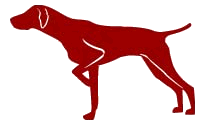
About the Breed
| Good Points
|
- Vizslas have a short, sleek coat that requires minimal grooming.
- They are very good at alerting you to anybody coming to the door.
However, they can be loud and rowdy
and must be taught not to jump on guests or 'mouth' them. because
they are so vocal, it is not uncommon for them to become
recreational barkers.
- They are generally very good with considerate children, and are
naturally protective of them.
- They are excellent jogging and walking companions. This
breed must have a lot of exercise - after all, they were bred to be hunted all
day long!!
- They are very curious and want to be part of whatever you are
doing. They should be indoors when you are home, as they very much
want to be a part of the family. If not allowed to be part of the
family, they can become very destructive and develop numerous
neurotic habits.
- Overall, they are a vigorous and long-lived dogs. Average life
span is about 12 years - 14 years.
- They are very playful and will invent games to play with you. They
do not lose their free spirit or love of life as they age.
- They are very sensitive to your moods and want to be touching you
when they lie down.
- Most are good hunting companions.
- They love to retrieve and carry things. A word
of CAUTION: this includes your shoes, clothes, and the children's
toys.
- They love to go with you anytime, anyplace and anywhere.
- They are intelligent, easy to train, and want to please. However,
they are very willful.
|
| |
|
Bad Points
|
- Vizslas can be destructive and many are chewers until they
reach maturity. Some are chewers their entire lives.
- They will eat anything - pantyhose, VCR tuners, sofas,
pillows, sheetrock walls, eyeglasses, etc. They are also natural
thieves and you must learn to keep things out of their reach. No
more food left out on the counters! Many of them are championship
diggers.
- As a result of the above two traits, a crate or other safe
place for confinement when not supervised is a MUST with this
breed.
- They are too clever for their own good, and can be very
stubborn and manipulative. They will try to get away with
everything possible.
- They must have consistent discipline and positive
(motivational) obedience training at an early age. Otherwise,
both dog and owner will be miserable.
- They can be too rowdy for small children and the elderly.
- See Good Points 2 and 5.
- They are prone to hip
dysplasia and other hereditary
conditions.
- They were selectively bred to hunt anything with fur or
feathers, and will harass squirrels, cats, birds, and anything
else that can be interpreted as prey. The sometimes incessant
barking at small animals annoys the neighbors.
|
|